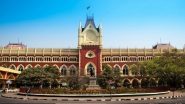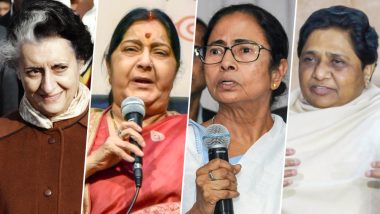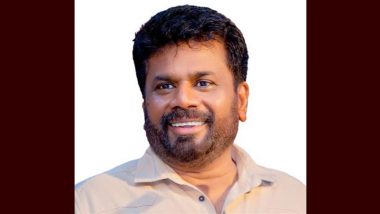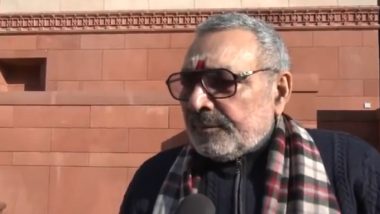International Women's Day is celebrated on March 8 every year. International Women's Day is celebrated to mark the achievements of women in various fields and create awareness for equal rights for them. The theme of Women's Day 2019 is #BalanceforBetter in a bid to make a more gender-balanced world. Women have been playing a vital role in India's freedom struggle and the post-Independence era. The participation of female politicians in the making of India has grown over the years.
From Indira Gandhi, who became the first woman prime minister of the country, to regional heavyweights such as Mamata Banerjee and Mayawati, India has a long list of woman politicians who helped in shaping the country. On this Women's Day, let's have a look at powerful female politicians of India. International Women's Day 2019 Theme: History and Significance of The Day That Promotes Women's Rights.
Indira Gandhi:
Born on November 19, 1917, Indira Gandhi was the first and, to date, the only female Prime Minister of India. She is the second longest-serving Prime Minister after her father Jawaharlal Nehru, the first prime minister of the country. As controversial her actions and stances may have been, there is no denying the impact she left on Indian politics. Her call to go to war with Pakistan, which split the hostile neighbour into two parts, built her image as a strong leader. Her decision to impose emergency in 1975 remains controversial. Women's Day 2019: Meet The Lady Officers in Indian Defence Forces, Who Made The Nation Proud.
Sonia Gandhi:
Sonia Gandhi can be called a reluctant politician. However, when she took the plunge in 1997 after her husband Rajiv Gandhi's assassination, Sonia Gandhi led from the front throughout her political career which is not over yet. Despite leading the Congress party to two back to back victories in Lok Sabha polls, Sonia refrained from taking any government post. However, she continued to play an active role behind the stage. She holds the record of having served as Congress President for more than a decade. Sonia has been widely described as one of the most powerful politicians in the country, and is often listed among the most powerful women in the world.
Priyanka Gandhi Vadra:
Another member of the Gandhi family, Priyanka Gandhi Vadra, has recently joined active politics. However, she has been playing an active role in strategising political campaign for mother Sonia and brother Rahul. Priyanka Gandhi, who has a striking resemblance to her grandmother Indira, always draws a huge crowd. Her administrative skills are yet to be tested, but she holds a distinctive authority in the grand old party.
Sushma Swaraj:
Sushma Swaraj is one of the most prominent leaders of the BJP. Swaraj has been elected seven times as a Member of Parliament and holds the record of being the youngest union cabinet minister. She too served as a Chief Minister of Delhi. She is Indian Parliament’s first and the only woman MP honoured with the Outstanding Parliamentarian Award. As the Minister of External Affairs, Swaraj has won millions of hearts with her swift response to people in distress.
Nirmala Sitharaman:
Nirmala Sitharaman is serving as the Defence Minister of India. An alumnus of premier Jawaharlal Nehru University, Sitharaman joined the Bharatiya Janata Party (BJP) in 2008. Before her induction into union cabinet in 2014, Sitharaman was known as fierce spokesperson the BJP. In a short span of her political career, Sitharaman has managed to become one of the top ministers in the government.
Mamata Banerjee:
The Chief Minister of West Bengal, Mamata Banerjee, is the founder of Trinamool Congress party or TMC and the chairperson of it since its foundation in 1997. In 2011, she led her party to defeat the 34-year-old CPM rule in West Bengal, the world's longest-serving democratically elected communist government in the process. Banerjee, who is often referred to as Didi, retained power in 2016 and has since emerged a powerful opponent of Prime Minister Narendra Modi led BJP government at the Centre.
Mayawati:
Mayawati, the chief of Bahujan Samaj Party (BSP), is a Dalit icon. As a strong Dalit leader, she has served as a Chief Minister of Uttar Pradesh for four terms. She holds the record of being youngest Chief Minister of Uttar Pradesh and the first female Dalit Chief Minister in India. In terms of seats, Mayawati's BSP drew a blank in 2014 Lok Sabha elections, however, her appeal among Bahujans, Muslims and other backward sections remained intact.
J Jayalalithaa:
Jayalalithaa, who started her career as an actress, went on to become one of the most powerful leaders in Tamil Nadu. She served five terms as the Chief Minister of Tamil Nadu for over fourteen years between 1991 and 2016. Although Jayalalithaa's political prominence remained confined to one state, politicians across parties and states admire her for her leadership. Her political career was marred by her conviction in a disproportionate assets case.
Sheila Dikshit:
The current president of Congress's Delhi unit, Sheila Dikshit, served as the chief minister of the national capital for a period of 15 years from 1998 to 2013. She became the governor of Kerala on 11 March 2014, however, she resigned from the post on 25 August 2014. Many thought that her political career ended in 2013 when Arvind Kejriwal had defeated her. However, Dikshit made a comeback as Congress chief of Delhi in January 2019 and has been supervising the party's campaign for the upcoming Lok Sabha polls.
Vasundhara Raje:
The former chief minister of Rajasthan, Vasundhara Raje Scindia, is one of the most powerful politicians in the state. Introduced by her mother Vijayraje Scindia to active politics, Vasundhara was elected to the Rajasthan Legislative Assembly in 1985. She served as the chief minister twice and was the first woman to hold the post in Rajasthan. She is currently the national vice president of the BJP.
Harsimrat Kaur Badal:
Harsimrat Kaur Badal, who is the Union Cabinet Minister of Food Processing, entered politics in 2009 when she successfully contested Lok Sabha election against Congress candidate Raninder Singh. She was re-elected as an MP from Bathinda in 2014. Kaur has emerged as an outspoken politician in Punjab. A member of Shiromani Akali Dal, Kaur belongs to a politically influential Badal family in the state.
Mehbooba Mufti:
Mehbooba Mufti is India's second Muslim woman chief minister after Syeda Anwara Taimur of Assam. She served as the Chief Minister of Jammu and Kashmir from 4th April 2016 to 19th June 2018. Mufti, the current president of the People's Democratic Party (PDP), was elected to the Lok Sabha from Anantnag seat in 2004 and 2014. After her father Mufti Mohammed Sayeed's death in 2016, who was heading the coalition government in Jammu and Kashmir, Mehboob came forward and held his father's position. She is one of the few female politicians from Kashmir who is recognized across India.
Supriya Sule:
National Congress Party (NCP) leader and Baramati MP Supriya Sule is the daughter Maharashtra's Maratha leader Sharad Pawar. According to data from the PRS Legislative Research website, Sule asked 1,181 questions, moved 22 private member’s bills, initiated 152 debates and has an attendance of 96 per cent, making her among the best parliamentarian in the 16 Lok Sabha. She has been a vocal politician when it comes to issues related to women. In 2011, she launched a statewide campaign against female foeticide. Many believe, Supriya has all qualities to succeed Pawar as the NCP chief.
(The above story first appeared on LatestLY on Mar 05, 2019 07:48 PM IST. For more news and updates on politics, world, sports, entertainment and lifestyle, log on to our website latestly.com).












 Quickly
Quickly




















